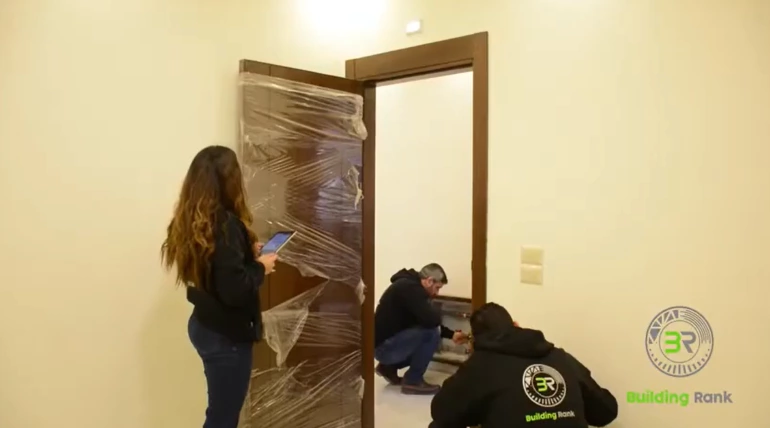Saudi Arabia, Eastern Province, Al-Khobar, Al-Jisr District, Abdul Rahman Al-Salami Street
Learn the 9 questions you should ask before buying a new home

New home
Learn the 9 questions you should ask before buying a new home
When you are looking to buy a new home, a pre-purchase inspection is an important part of the buying process. It is a good opportunity to get a general idea of the property. It is essential to inspect the interior and exterior for any things you like, things you don’t like, or defects in the property. The importance of the inspection is that you may change your mind about whether or not you want to buy it after seeing the results of the inspection.
In our article, we will talk about how to inspect the new home you want to buy, the questions to ask during the inspection, and some red flags to watch out for when conducting the inspection.
Article content:
- How to inspect a new home.
- 9 Questions to Ask During an Examination.
- Things to look for when inspecting a new home.
- What are some red flags in a new home inspection?
First: How to inspect a new home:
It is not advisable to buy any new home before having an inspection done, because even if you think the place you want to buy is perfect, you will never know until you have it inspected. To do this you can hire a service from inspection companies to do this for you for a fee, as they can look for things that you may miss.
The inspection will not take long, and is usually carried out by professional engineers from all specialties. The inspection can be carried out even if there are residents in the house, and we, BUILDING RANK, have sufficient experience to inspect the new house you intend to buy, and we provide you with a comprehensive report of all the defects in it from all aspects.
Second: 9 questions to ask before buying a new home:
When looking for a new home for you and your family to buy, you should ask some important questions to the agent or homeowner, such as:
-
Have any modifications or renovations been made?
This can give you a better idea of the property's true value, and give you some ideas when you decide to renovate the home after you own it, or do renovations yourself in the future, asking about previous work can give you an idea of the improvements you intend to make.
-
Why do homeowners want to sell their home?
Asking this question, in addition to “how long has it been on the market,” may give you an advantage if you discover that the owners are desperate to sell, for example. The more you know about why current homeowners want to sell, the better idea you’ll have of what kind of offer they’ll be willing to accept.
-
What is the price per square meter that the homeowner is asking for?
Asking about the expected selling price of the home will help you get a better indication of whether or not the home is within your budget.
-
Are there any structural problems in the building?
This way you can be aware of any potential structural defects or problems in the property. You should take into account water stains, sagging or cracked ceilings, mold and other issues that may need repairs once you buy the home.
-
Are there copies of the title report and plans?
Plans, soil reports, pest inspections, and home condition reports will help you avoid buying a property with structural problems, as well as inquire about property taxes and legal issues.
-
What are the features of this house?
You should have a look at it yourself by taking a tour around the area, this can help you see how close the property is to things like public transport, shops, schools etc.
-
Are there similar properties for sale?
Asking this question can let the seller know you are a serious buyer, and can let you know whether the price per square meter for this property is its true value. If you are not successful with the purchase of this home, it can give you a good opportunity to look for another property.
-
What direction is the new house located relative to the sun?
The orientation of a house plays a big role in how much natural sunlight enters the house during the four seasons.
-
What are your future development plans?
Try to find out what the future plans are for the area around the house, and what changes may occur in the long term, such as infrastructure projects, or zoning changes.
Third: Things to look for when inspecting a new home:
In addition to the previous questions, there are many things that must be checked when buying a new home. You should also pay attention to these things:
- Any signs of water damage or mold (check inside cabinets and under sinks), as this could indicate a leak somewhere.
- Check the walls for any cracks (inside and outside the house), as large cracks are a cause for concern.
- Check your bathrooms for mold as well, as too much mold is bad for your health and can also indicate leaks.
- Open all doors and windows to see if they are difficult to open.
- Turn all the lights on and off to see if any are broken or faulty.
- Go to a quiet room and check the noise (if it's near a busy road or train station, there may be a lot of noise pollution, for example).
- Check the number and size of the rooms, and measure them to see if the stated sizes are correct.
- Look for any sagging in the ceiling and any signs of damage to the ceiling if possible.
- Check gutters for rust if possible.
- Check the faucets to see if they are working properly.
- Check the floors.
- Check for any peeling paint.
- One of the most important things to consider when thinking about buying a property - whether it's a place to live or an investment property - is "location, location, location."
- Check the level of natural light the property gets.
- How close is the property to essential amenities, such as public transport, shops, hospitals, good schools, cafes, restaurants and parks.
- Ask yourself are you satisfied with the layout of the house and are there enough rooms?
You can also think outside the box, such as checking for any strange smells or even running an internet test to make sure it is available.
Fourth: What are some red flags in a new home inspection?
In addition to the above, there are some serious red flags that you should pay attention to when conducting a home inspection, such as:
-
Major damage due to insects:
Pests such as termites, mice and rats can be annoying and, in the case of termites, can threaten the safety of your home. A pest inspection can help identify any nuisance critters.
-
Structural damage:
Such as large cracks in walls or floorboards and rotting stairs, they may be indicators of deeper problems, and may cost you a considerable amount to fix.
-
Presence of water leaks:
There may be some evidence of a lot of mold and water damage because the previous owner was negligent of the property, and it may mean something bad, such as poor drainage of the property. This can cause problems.
-
Presence of sloppy handwork:
The previous occupants may have added a new room with a sloping floor themselves, or put in some new, bad plumbing. This may not be immediately obvious so you'll need a keen eye.
These red flags can ruin a new home purchase deal, because homes with major defects like the ones we talked about can lead to additional costs in the future to repair them, and of course health and safety problems.
Conclusion:
When considering buying a new home, you should have a comprehensive inspection of it. The inspection report will include comprehensive information about the property, including the estimated price range, comparable sales in the area, an overview of the neighborhood and the services in the area.
Do not hesitate to contact us

 العربية
العربية English
English 




Related Information:
How to Choose the Right Home Space for You and Your Family
Choosing the right home space for you and your family can be difficult because every family has different needs and desires in their home. In order to make the right choice, it is natural to think about the number of people currently and in the future, so it is best to consider these needs before deciding on the ideal option.
Read MoreTop 5 Features of Infrared Building Inspection
Humidity is a very common problem that causes serious damage to the building, but do not worry, now there is an infrared building inspection available, as it has become possible to conduct the inspection using these devices and detect the causes of humidity, and then take the necessary measures to eliminate these causes in order to preserve your money and property.
Read More